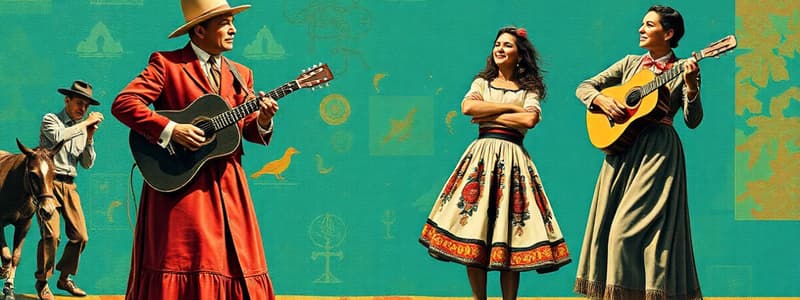Podcast
Questions and Answers
What is Jarabe Tapatío often referred to as?
What is Jarabe Tapatío often referred to as?
- The Mexican folk dance
- The Mexican hat dance (correct)
- The Mexican flamenco
- The Mexican salsa dance
In which city did Jarabe Tapatío originate?
In which city did Jarabe Tapatío originate?
- Monterrey
- Puebla
- Mexico City
- Guadalajara (correct)
Which traditional outfit do female dancers wear in Jarabe Tapatío?
Which traditional outfit do female dancers wear in Jarabe Tapatío?
- China poblana outfit (correct)
- Charro suits
- Western-style dresses
- Mexico City dresses
What was a significant change in the performance of Jarabe Tapatío after the Mexican War of Independence?
What was a significant change in the performance of Jarabe Tapatío after the Mexican War of Independence?
What is the origin of the word 'yodel'?
What is the origin of the word 'yodel'?
Which musical style did Jimmie Rodgers blend with yodeling in his recordings?
Which musical style did Jimmie Rodgers blend with yodeling in his recordings?
What is one significant characteristic of yodeling?
What is one significant characteristic of yodeling?
How did the church react to Jarabe Tapatío?
How did the church react to Jarabe Tapatío?
When did yodeling become popular in entertainment venues?
When did yodeling become popular in entertainment venues?
Which iconic film featured a well-known yodeling scene?
Which iconic film featured a well-known yodeling scene?
What does 'Jarabe' translate to in English?
What does 'Jarabe' translate to in English?
Which clothing style is associated with male dancers in Jarabe Tapatío?
Which clothing style is associated with male dancers in Jarabe Tapatío?
What was the initial view of the church towards Jarabe Tapatío?
What was the initial view of the church towards Jarabe Tapatío?
What does the term 'blue yodel' refer to?
What does the term 'blue yodel' refer to?
What was a major purpose of yodeling in Alpine cultures?
What was a major purpose of yodeling in Alpine cultures?
How did Jarabe Tapatío evolve after the Mexican War of Independence?
How did Jarabe Tapatío evolve after the Mexican War of Independence?
In which decade did Jimmie Rodgers first release his recording of 'Blue Yodel No. 1'?
In which decade did Jimmie Rodgers first release his recording of 'Blue Yodel No. 1'?
What is a common feature of yodeling in modern European folk music?
What is a common feature of yodeling in modern European folk music?
What cultural significance did Jarabe Tapatío gain after being banned by the church?
What cultural significance did Jarabe Tapatío gain after being banned by the church?
What is one reason yodeling gained popularity in the 1830s?
What is one reason yodeling gained popularity in the 1830s?
What cultural role did Jarabe Tapatío play after its ban by the church?
What cultural role did Jarabe Tapatío play after its ban by the church?
Which element of Jarabe Tapatío's dance movements reflects its historical origins?
Which element of Jarabe Tapatío's dance movements reflects its historical origins?
What aspect of yodeling contributes to its widespread presence across cultures?
What aspect of yodeling contributes to its widespread presence across cultures?
How did Jimmie Rodgers distinguish his type of yodeling from the European form?
How did Jimmie Rodgers distinguish his type of yodeling from the European form?
What was a major transformation in the demographic of Jarabe Tapatío's dancers after the 19th century?
What was a major transformation in the demographic of Jarabe Tapatío's dancers after the 19th century?
What musical component played a significant role in the popularity of yodeling in the 1830s?
What musical component played a significant role in the popularity of yodeling in the 1830s?
What is the primary function of yodeling as practiced in Alpine cultures?
What is the primary function of yodeling as practiced in Alpine cultures?
What is implied by the description of female dancers' attire in Jarabe Tapatío?
What is implied by the description of female dancers' attire in Jarabe Tapatío?
How has yodeling maintained its cultural relevance in contemporary folk music?
How has yodeling maintained its cultural relevance in contemporary folk music?
Which historical influence contributed to the development of the Jarabe Tapatío's courtship characteristics?
Which historical influence contributed to the development of the Jarabe Tapatío's courtship characteristics?
Study Notes
Jarabe Tapatío (Mexican Hat Dance)
- National dance of Mexico.
- Name combines "jarabe" (syrup/mixture) and "tapatio" (from Guadalajara, Jalisco).
- Originated as a courtship dance in 19th-century Guadalajara; elements trace back to Spanish zambra.
- Women traditionally wear china poblana; men dress as charros.
- Dance involves flirtatious steps around partner's hat.
- Initially performed by women (18th century), later by mixed couples post-Mexican War of Independence.
- Church initially banned it as immoral, increasing its popularity as a symbol of dissent.
- Popularized in media (e.g., The Simpsons) during 1990s-2000s.
Yodeling
- Singing technique with rapid pitch changes between chest and head registers (falsetto).
- "Yodel" derives from German "jodeln" ("to utter 'jo'").
- Used globally across cultures.
- Long tradition in Alpine Europe; herders used it for communication.
- Became popular theater entertainment in the 1830s.
- Remains prominent in folk music of Switzerland, Austria, and southern Germany.
- Jimmie Rodgers' 1928 "Blue Yodel No. 1" blended Alpine yodeling with African American musical styles.
- Featured in popular culture (e.g., The Sound of Music).
Jarabe Tapatío (Mexican Hat Dance)
- National dance of Mexico.
- Name combines "jarabe" (syrup or mixture) and "tapatio" (from Guadalajara, Jalisco).
- Originated as a courtship dance in 19th-century Guadalajara.
- Roots trace back to the Spanish zambra (flamenco dance) from the viceroyalty era.
- Traditionally features a female dancer in a china poblana outfit and a male dancer dressed as a charro.
- Dance involves flirtatious stepping around the brim of a partner's hat.
- Initially performed by women in the 18th century.
- Became a mixed-couple dance after the Mexican War of Independence.
- Initially banned by the church as immoral, leading to increased popularity as a symbol of Mexican dissent.
- Popularized in various media (TV, music, ringtones) in the 1990s-2000s.
Yodeling
- Singing technique involving rapid pitch changes between chest and head registers (or falsetto).
- "Yodel" comes from the German "jodeln," meaning "to utter the syllable jo."
- Used globally across various cultures.
- Long-standing tradition in the European Alps, likely used by herders for communication.
- Became popular theater entertainment in the 1830s.
- Remains a significant feature of folk music (Volksmusik) in Switzerland, Austria, and southern Germany.
- Jimmie Rodgers blended Alpine yodeling with African American music styles in his 1928 "Blue Yodel No. 1."
- "Blue yodel" sometimes distinguishes the American style from earlier Austrian yodeling.
- Featured prominently in the film The Sound of Music.
Jarabe Tapatío (Mexican Hat Dance)
- National dance of Mexico.
- Name combines "jarabe" (syrup or mixture) and "tapatio" (from Guadalajara, Jalisco).
- Originated as a courtship dance in 19th-century Guadalajara.
- Roots trace back to Spanish zambra (flamenco dance) from the Spanish Viceroyalty era.
- Women traditionally wear china poblana; men dress as charros.
- Dance involves flirtatious steps around a partner's hat.
- Initially performed solely by women (18th century).
- Became a mixed-couple dance after the Mexican War of Independence.
- Initially banned by the church as immoral, its popularity increased as a symbol of dissent.
- Gained popularity in the 1990s-2000s through TV, music, and ringtones (e.g., The Simpsons).
Yodeling
- Singing technique with rapid pitch changes between chest and head registers (falsetto).
- "Yodel" derives from the German "jodeln" ("to utter the syllable jo").
- Used globally across various cultures.
- Long-standing rural tradition in the European Alps; herders used it to call flocks and communicate.
- Became popular theatrical entertainment in the 1830s.
- Remains a key element of folk music (Volksmusik) in Switzerland, Austria, and southern Germany.
- Jimmie Rodgers' 1928 "Blue Yodel No. 1" blended Alpine yodeling with American blues and folk styles.
- "Blue yodel" differentiates American from earlier Austrian yodeling.
- Featured prominently in the film The Sound of Music.
Studying That Suits You
Use AI to generate personalized quizzes and flashcards to suit your learning preferences.
Description
Test your knowledge on two distinct cultural dance forms: the beloved Jarabe Tapatío of Mexico and the unique singing technique of yodeling. Explore their origins, traditional attire, and cultural significance. Perfect for fans of world music and dance history.




